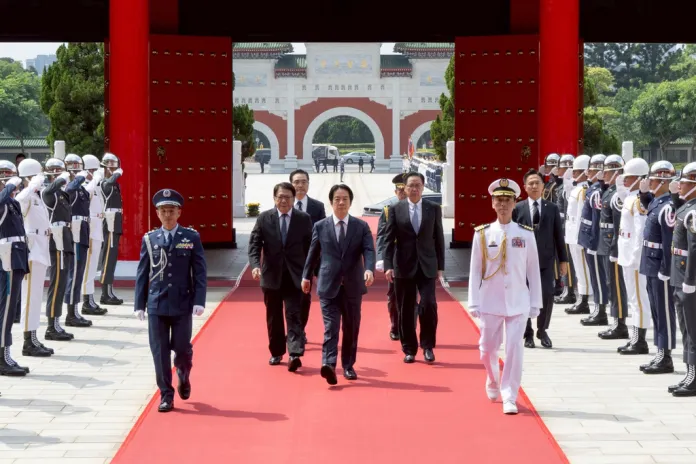The People’s Republic of China is furious with Taiwanese President William Lai, whom they accuse of groveling to the United States for support.
Lai said during a Tuesday appearance on the U.S.-based Clay Travis and Buck Sexton Show that President Donald Trump would be able to fulfill his Nobel Peace Prize dreams by helping settle the cross-strait dispute between Taiwan and China.
“If he is able to convince Xi Jinping to permanently renounce the use of force against Taiwan, President Trump will surely win the Nobel Peace Prize,” Lai said.
TRUMP ‘DENIED $400M IN MILITARY AID TO TAIWAN’ AS HE SEEKS TRADE DEAL WITH CHINA

During that interview, Lai warned that failing to confront China in its machinations to overtake the island would embolden Beijing and jeopardize future U.S. security.
“If it is able to annex Taiwan, China will be in a stronger position to compete with the United States and alter the rules-based international order,” warned Lai. “So we hope that President Trump can continue to maintain peace and stability in the Indo-Pacific.”
The mainland’s Taiwan Affairs Office released a statement on Wednesday, lambasting Lai for what they characterized as unbecoming groveling to the U.S.
“Lai Ching-te and the ‘Taiwan independence’ forces are but ants shaking a tree: they will ultimately be swept into the dustbin of history,” a statement read.
It went on to accuse the Taiwanese president of engaging in “unprincipled foreign pandering and bottomless selling out of Taiwan, squandering the flesh and blood of the people, prostituting himself and throwing in his lot with foreign forces.”
TRUMP ADVISES THAT ANYONE BURNING AMERICAN FLAG WILL BE IMPRISONED FOR A YEAR
Such forceful and descriptive language is rarely seen in official Chinese Communist Party communications, suggesting that Lai’s catering to Washington has touched a nerve.
Taiwan — an island off the coast of the mainland, officially known as the Republic of China — considers itself a sovereign, democratic nation.
The People’s Republic of China considers the island a part of its territory and views the Taiwanese government as an illegitimate rebel government.
The reclamation of control over Taiwan is among the Chinese Communist Party’s preeminent geopolitical goals, with the People’s Liberation Army expected to be prepared for an eventual invasion by 2027.
The U.S. military is widely considered the only force standing between China and the conquest of the island.
Taiwan is not recognized as an independent country by the U.S., which holds to a One-China policy favoring the People’s Republic of China. Under this arrangement, the U.S. military cooperates with the Taiwanese armed forces, and the two countries share economic relations without formal diplomacy.
Trump’s second term has disrupted this delicate system of unofficial support. The president moved to deny $400 million of military aid to Taiwan last month, a decision many have attributed to his desire for a workable trade deal with Chinese President Xi Jinping.
Lai has claimed, despite stumbling blocks such as this — a result of diverging priorities between the two countries — that Trump is more supportive of the Taiwanese people than past administrations.
“The United States shoulders the responsibility of safeguarding global security and peace, while at the same time, it also faces its own domestic challenges,” Lai said. “In trade negotiations, we must, of course, act in accordance with our national interests and the interests of our industries, while also safeguarding food security and the health of our people.”
He continued: “However, in diplomacy, defense, and other areas, cooperation with Taiwan, and the assistance extended to Taiwan, has not ceased or diminished under President Trump; on the contrary, it has continued to grow stronger.”
Eric Chu, the leader of the conservative opposition party Kuomintang, has warned against over-reliance on the U.S. to stop Chinese aggression.
“To want to rely on Washington, Trump, or any other person to create cross-strait dialogue, exchanges and peace, is not as good as relying on our own efforts and the people’s efforts,” the lawmaker said Wednesday at a KMT central standing committee meeting.
POLITICAL VIOLENCE ON THE RISE IN THE US: A TIMELINE OF KEY INCIDENTS
The White House’s views regarding the long-term future of Taiwan — and whether the president would deploy military force to defend it — remain largely unknown. The island’s diplomatic corps is unable to negotiate with Trump directly due to the lack of formal relations.
Trump has claimed, however, that Xi personally promised him not to invade the island while he is president.
